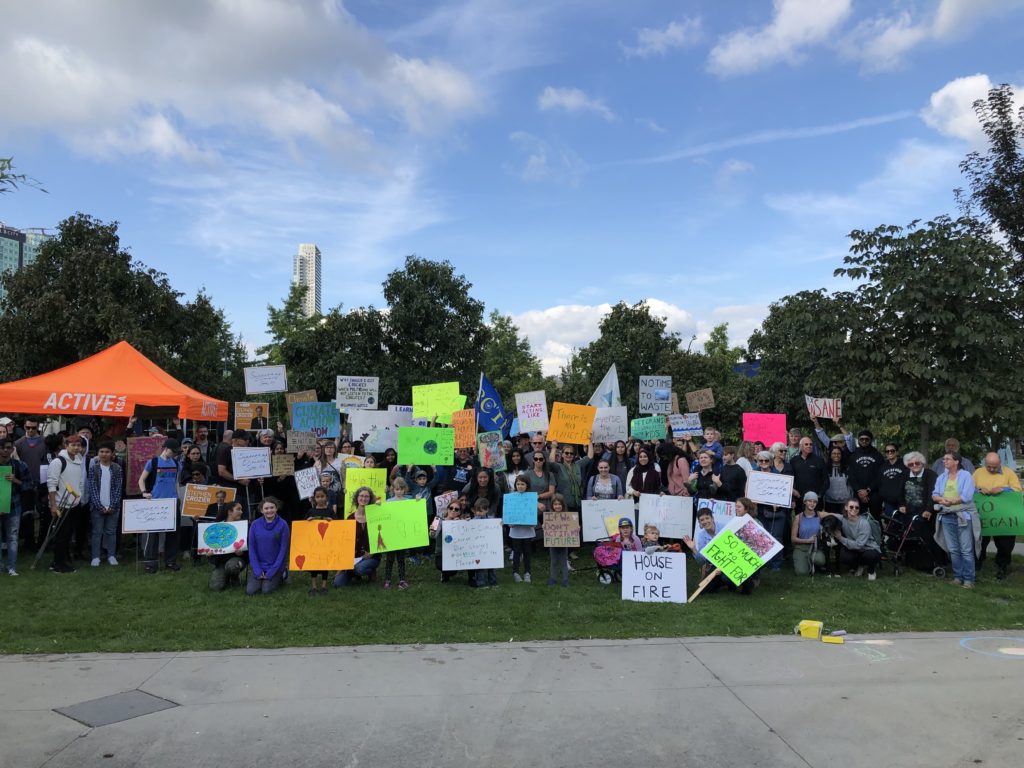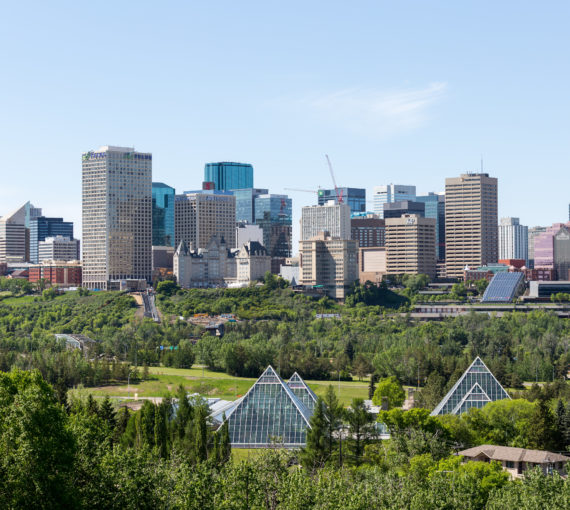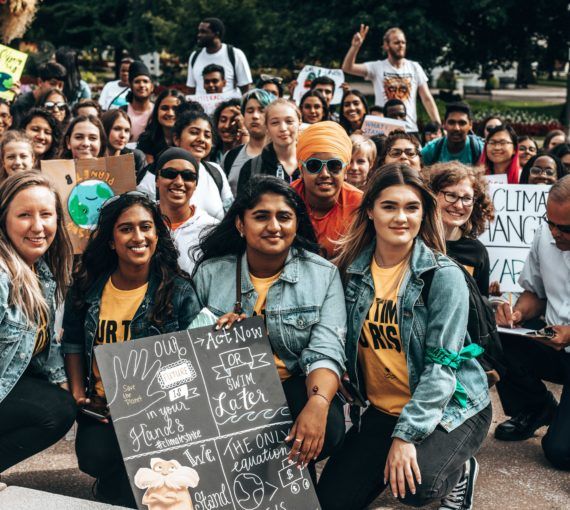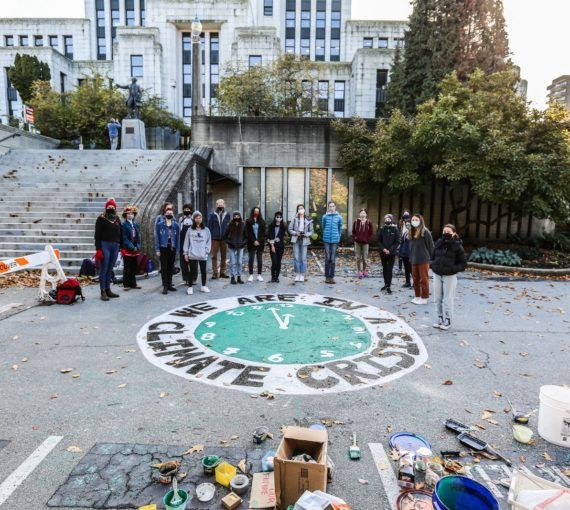
A crowd gathered for the September 20, 2019 climate strike in Surrey, B.C. (Photo: Surrey for Future)
Allison Richardson first learned about climate change in the 1980s. At the time, she felt like an outlier for caring about something that many saw as a far-off problem.
It’s why the global climate strike movement that started in 2018 felt like something she had been “waiting her whole life for.”
Allison is a librarian in Surrey, B.C. During the strikes, she noticed that students were heading to nearby Vancouver to participate. This seemed like a missed opportunity for the second largest municipality in the province by population.
Mindful not to co-opt what had started out as a youth-led movement, Allison and co-worker Erin Pedersen asked around to see if anyone was already organizing a strike in Surrey. When it was clear that no one was, they decided to hold their own.
They gathered at the Surrey Museum on May 3, 2019, under the name Surrey for Future. Around 30 of their friends and family, and even folks they didn’t know, turned out for a spirited march.
Buoyed by the turnout, the new group wondered what to work on next.
Youth talk to their friends, their parents; they get on social media. Once you get youth organizations involved, that’s when things spread quickly.
Declaring a climate emergency
From the relationships made through the climate strike movement, the members of Surrey for Future learned that a hodgepodge of environmental groups were working separately to get the city to update its climate targets and declare a climate emergency.
Allison and Erin’s first step was to pool these efforts by bringing all the groups together in a joint coalition. Their second step was to find a councillor ally who could bring the motion to council.
Scanning the local newspapers led them to Coun. Steven Pettigrew, who was working on environmental issues in the city. He was enthusiastic about championing the cause, but he warned they would need to show strong public support for the idea.
This was an important lesson for Allison: that community members really do have influence over municipal matters in their community.
“When people are speaking up and sharing their vision with the city, that’s when you make change. You don’t have to have all the details of how it should be done. What matters is showing every level of government what the people want.”
How do you get strong public support behind an issue? According to Arshia Uppal, a high school student at the time of the strikes, it helps to get the youth on board.
Arshia began collaborating with the climate emergency coalition after looking for Surrey-specific ways to get involved. She founded her own youth-led organization, Climate Clock, which later merged with the Sustainabiliteens.
“Youth talk to their friends, their parents; they get on social media. Once you get youth organizations involved, that’s when things spread quickly.”
When people are speaking up and sharing their vision with the city, that’s when you make change. You don’t have to have all the details of how it should be done. What matters is showing every level of government what the people want.
Schooling council
The coalition started to make their presence known at Surrey City Hall. They wrote letters, sent emails and attended each council meeting in bright green shirts.
“We tried to bring in a new audience, especially youth and racialized youth,” Arshia says. “Because when you look at who comes to these council meetings, it’s predominantly older people.”
After a while, it was time to put faces and stories to the green shirts at the back of the meeting hall. Equipped with talking points, the group began to request small meetings with each councillor so that they could introduce the idea of a climate emergency declaration in a more personal setting.
These two-on-one meetings were invaluable for pushing the issue to the top of the councillors’ minds and for educating them on what a meaningful declaration would include, such as a directive to align climate targets with IPCC recommendations.
However, the meetings were sometimes a source of frustration for Arshia.
“It’s really unfortunate when you’re meeting with someone who has political power and they say, ‘We believe in the youth.’ No, we’re asking you to help us.”
Nevertheless, Arshia recommends meeting councillors halfway by appreciating any progress or wins they’ve already made on environmental issues. Allison also suggests remaining respectful and courteous, while still “demonstrating that you’re not going to stop until they make big changes.”
Leading up to the climate emergency vote on November 4, 2019, the coalition hand-delivered bundles of children’s letters and artwork to City Hall to remind councillors about the impact of inaction on future generations. It helped. The motion passed unanimously.
Though COVID has slowed down the City of Surrey’s climate work, staff are now building a detailed climate action plan based on that first declaration. Surrey for Future is still working hard to keep up the momentum around the plan, while Arshia and the Sustainabiliteens are addressing the barriers that prevent BIPOC youth from getting involved in climate action.
If there’s one thing the city could do to help residents become more engaged in municipal matters, it would be to make its information more accessible to all, Arshia says.
She explains how difficult it is to keep track of what was going on at the municipal level: “I didn’t even know when council meetings were scheduled until I did a really deep dive through their website.”
Until then, community and environmental groups can help by communicating this information to a broader audience, especially immigrant families and non-English speaking populations.
Allison’s vision for the future of Surrey includes a truly engaged community that will hold the city accountable to its climate commitments.
She believes that “people are looking for ways to make a difference, but they don’t necessarily know who to connect with or how to do it.
“As an individual citizen, my role is to do everything I can to help create the political will for change. The most important thing I can do is connect with people and bring them out. If you are positive and friendly, they will come.”
When Allison feels tired, she has a metaphor that keeps her going.
She likes to picture a group of people pushing a boulder up a hill. It’s hard work, and it requires many hands, but at some point, the boulder reaches a tipping point. As it goes over the edge, the momentum builds and builds. Finally, the boulder takes on a life of its own.
As an individual citizen, my role is to do everything I can to help create the political will for change. The most important thing I can do is connect with people and bring them out. If you are positive and friendly, they will come.
Allison would also like to recognize the contributions of Morag Keegan-Henry, the Force of Nature Alliance, Sebastian Sajda, Rochelle Prasad and the SPARK Foundation, the former Surrey Environmental Sustainability Advisory Committee, Michel Touzard and the Surrey Green New Deal group, the Vancouver Sustainabiliteens and the many other dedicated citizens of Surrey who attended meetings, met with councillors and wrote letters in support of the climate emergency declaration.
This story is part of Your Voice at the Table: a Guide to Mobilizing Local Government Climate Action. Learn to work with your local government so you can build a healthy, sustainable, resilient future together.



